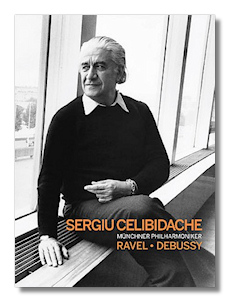
The Internet's Premier Classical Music Source
Related Links
-
Debussy Reviews
Ravel Reviews - Latest Reviews
- More Reviews
-
By Composer
-
Collections
DVD & Blu-ray
Books
Concert Reviews
Articles/Interviews
Software
Audio
Search Amazon
Recommended Links
Site News
 DVD Review
DVD Review
Celibidache Conducts Ravel & Debussy

- Maurice Ravel:
- Alborado del gracioso
- Rhapsodie espagnole
- Boléro
- Claude Debussy:
- Prélude à l'Après-midi d'un faune
- Ibéria
Munich Philharmonic Orchestra/Sergiu Celibidache
Idéale Audience International EDV3077968 DVD 101:00 Dolby Digital Full Screen
It is likely that Romanian-born conductor Sergiu Celibidache is more famous now than he was at any point during his long career. During most of his lifetime, he refused to make studio recordings, believing that they were a poor substitute for listeners' participation in an actual live concert, in which no two performances could ever be alike. Since his death, however, his family has allowed major labels such as EMI and Deutsche Grammophon to release many of his live recordings. Because Celibidache had become such a cult figure later in life, his family argued that it was inevitable that his live recordings would be heavily pirated, and that it was better for responsible record labels to prepare these recordings for release, and for a share of the profits to be donated to organizations for which Celibidache had sympathy. As a result, in the last decade, there has been an outpouring of Celibidache on CD, with EMI releasing performances from his Munich years (1979-1996), and Deutsche Grammophon performances from his Stuttgart years (1971-1977).
The material on this DVD was recorded live on May 13 and 14 in 1994, a little more than two years before his death. Several of these works have been released by EMI as well, but not in identical performances, so collectors shouldn't worry about duplication. By now, Celibidache required assistance to reach the podium, and he sat instead of stood. (He was, after all, 81 years old at the time.) Mentally and spiritually, however, there's no diminution in Celibidache's abilities here. Not a nanosecond goes by when he isn't taking in musical data, processing it, and returning it to the members of the Munich Philharmonic.
Especially later in his career, Celibidache's performances featured famously slow tempos. This had nothing to do with his physical condition, but rather with his understanding of the relationship between time, music, and the space in which the music is performed. For an audience present in the concert hall, the tempos would not be perceived as unusually slow, although they might seem slow indeed to anyone listening at home to a recording of the same concert. (Did I mention that Celibidache practiced Zen Buddhism?) Celibidache also mistrusted easy emotional effects – the "wow factor," if you will – and orchestral showpieces that usually sound splashy can sound almost sullen in this conductor's hands.
So consider these performances: a 16-minute Faune, a 20-minute Boléro, and a (gasp) 30-minute Ibéria. Consider also Celibidache's comment that he couldn't think of any French conductor who was capable of conducting French music. Was Celibidache a genius, out of his mind, or just the kind of arrogant windbag for whom he claimed to have so much contempt? Predictably, it's not easy to come up with a simple answer. By ordinary standards, these performances are perverse. Ibéria, in particular seems to become some other piece of music entirely under Celibidache's dissection of it. Yet, at the same time, if this is madness, one cannot deny that there is a method to it. Celibidache knows what he wants and knows how to get it. (He was quite capable of spending 30 minutes of rehearsal time over a single chord.) When he gets it, a smile lights up his face; when he doesn't, that's all over his face too. One of the funny things about these readings is that the Munich Philharmonic doesn't even sound that great, much of the time, but I don't think a sensuous sound – at least in the normal sense – was terribly high on Celibidache's list of priorities. After all, beauty is just another lie.
By now, it should be clear that this DVD is not recommended to those who don't already know who Celibidache is, and who are looking merely for "nice" performances of these five French bon-bons. Those who want the possibility of what the conductor called a "transcendent experience," however, or who want to hear these works as if for the first time, will not find their time or their money wasted by this no-frills DVD. Set your expectations aside before sliding this in the DVD player. The cameras give the conductor and the musicians equal time, and the sound quality, while not excellent, is good enough.
Copyright © 2008, Raymond Tuttle





















